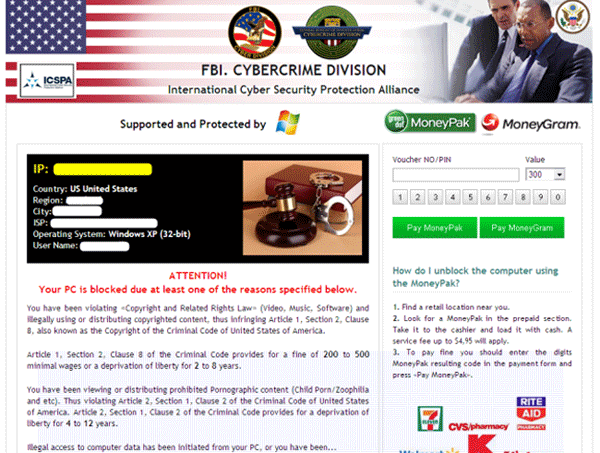MoneyGram Virus
Threat Scorecard
EnigmaSoft Threat Scorecard
EnigmaSoft Threat Scorecards are assessment reports for different malware threats which have been collected and analyzed by our research team. EnigmaSoft Threat Scorecards evaluate and rank threats using several metrics including real-world and potential risk factors, trends, frequency, prevalence, and persistence. EnigmaSoft Threat Scorecards are updated regularly based on our research data and metrics and are useful for a wide range of computer users, from end users seeking solutions to remove malware from their systems to security experts analyzing threats.
EnigmaSoft Threat Scorecards display a variety of useful information, including:
Ranking: The ranking of a particular threat in EnigmaSoft’s Threat Database.
Severity Level: The determined severity level of an object, represented numerically, based on our risk modeling process and research, as explained in our Threat Assessment Criteria.
Infected Computers: The number of confirmed and suspected cases of a particular threat detected on infected computers as reported by SpyHunter.
See also Threat Assessment Criteria.
| Threat Level: | 20 % (Normal) |
| Infected Computers: | 4 |
| First Seen: | May 6, 2013 |
| Last Seen: | September 18, 2022 |
| OS(es) Affected: | Windows |

MoneyGram Virus Image
The MoneyGram Virus is not a virus at all, but a ransomware Trojan infection that uses a common online practice to steal money from inexperienced computer users. What makes a virus to be different from a Trojan is that viruses are designed to corrupt files and to spread on their own within a computer or potentially from one computer to another. On the other hand, Trojans are usually installed by the computer users themselves, using trickery to convince them to open corrupted files associated with the Trojan infection (in that sense, they are named after the Trojan horse which was used to trick the people in Troy to let down their guard and allow soldiers to enter their city disguised as a gift). Ransomware infections like the MoneyGram Virus are specifically designed to make computer users believe that their computer has been seized by the FBI or another law enforcement agency, essentially taking the victim's computer hostage and then demanding the payment of a ransom.
Please Note: The MoneyGram Virus or any variation of the MoneyPak Ransomware is not related to the legitimate MoneyGram service or MoneyGram.com website. Ransomware threats may commonly utilize the legitimate name of a service like MoneyGram to attract attention or entice gullible computer users.
Table of Contents
The MoneyGram Virus is Another Example of Criminals Misusing the Name of a Reliable Company
The MoneyGram Virus is closely related to a large number of similar ransomware Trojans, most of which demand payment through MoneyPak, Greenday or MoneyGram, all of which are online payment services. In general, the MoneyGram Virus and its clones target computer users in the United States and North America and are derived from families of Police Ransomware Trojans that had their beginnings in Europe and used to demand payment through Ukash. The MoneyGram Virus blocks access to the victim's computer and displays a full screen message claiming that the FBI blocked the victim's computer because of copyright violations and distribution of illegal pornography. After threatening the victim with scary images of jail time and fees of thousands of dollars, the MoneyGram Virus claims that a one-time payment of $300 through MoneyGram or MoneyPak can allow the computer user to recover control of the infected computer. Needless to say, making this payment will do nothing to disinfect the victim's computer or remove the MoneyGram Virus infection.
To Pay the Ransom Demanded by the MoneyGram Virus is not a Solution
Since paying the MoneyGram Virus 'fee' will do nothing to remove this threat or unblock the victim's computer, it is important to ignore all of its messages and avoid following its instructions. Instead, security researchers advise computer users to use a reliable anti-malware program to remove the MoneyGram Virus infection completely. To prevent future infections, avoid suspicious downloads or links and use a strong anti-malware scanner to protect your computer.
URLs
MoneyGram Virus may call the following URLs:
| stoneoakjobs.com |

